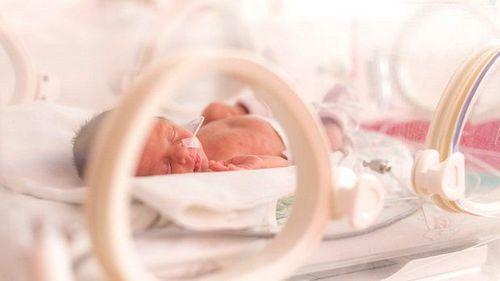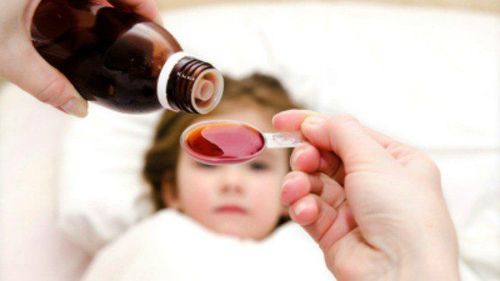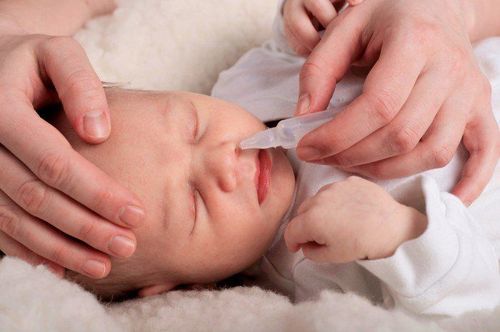This is an automatically translated article.
The article is professionally consulted by Master, Doctor Dang Huy Toan - Pediatrician - Neonatologist - Department of Pediatrics - Neonatology - Vinmec Nha Trang International General Hospital.Neonatal respiratory distress syndrome is common in premature infants, causing respiratory failure due to incomplete lung development, lack of surfactant leading to a decrease in alveolar surface area for gas exchange. It is one of the leading causes of death in premature infants.
1. Causes of respiratory failure in infants
Respiratory failure is a condition in which the respiratory system is not able to maintain adequate gas exchange according to the needs of the body. There are many causes of respiratory failure in newborns, but the first cause must be mentioned is due to premature birth. The younger the baby is born, the more likely it is to have respiratory failure.Infants born prematurely under 28 weeks, the incidence is 50 - 60%, especially the weight of babies under 1,000g or twins.

Suy hô hấp là một trong những nguyên nhân quan trọng gây tử vong hàng đầu ở trẻ sinh non tháng.
In addition, respiratory failure can also be due to genetic factors related to the child's lung development. Besides premature babies, there are some other factors that lead to respiratory distress syndrome in babies such as; The mother has antepartum hemorrhage, the baby is asphyxiated, hypothermia...
If the mother gives birth by cesarean section without going into labor, it is also the cause of the baby's respiratory failure due to the release of stimulating hormones during labor. Surfactant production and release, leading to increased pulmonary fluid reabsorption through the pulmonary lymphatic system. If the baby is delivered by cesarean section when the pregnant woman is not in labor, the baby is prone to surfactant deficiency and has a high volume of fluid in the lungs.
The cause of respiratory failure in children can also be due to some damage to the central nervous system such as encephalitis, meningitis, traumatic brain injury, brain hemorrhage, congenital heart disease, inflammation. bronchi, pneumonia, obstruction of the posterior nostril, obstacles in the respiratory tract such as sputum, milk, etc. These causes cause the adaptability of internal organs to maintain respiratory function. disorder causing respiratory failure.
There are also a number of other factors leading to respiratory distress syndrome in newborns such as:
Diabetic mother Carrying multiple pregnancies Perinatal damage: asphyxia and antepartum hemorrhage The amount of blood supplied to the baby in pregnancy is impaired.
2. Complications of respiratory failure in infants
Usually, after a few minutes or a few hours after birth, babies appear with severe respiratory distress syndrome without finding any causes such as bacterial infection, amniotic fluid asphyxia, aspiration of meconium, etc. Shortness of breath, rapid shallow breathing, breathing rate over 60 times/minute. The intercostal spaces, the depression on the sternum, are pulled, the wings of the nose rise and fall, the whole body is purple. Giving oxygen does not help... If it's severe, the signs of cyanosis, shortness of breath increase, blood pressure drops, body temperature drops, the child may die. If it is mild and with timely intervention and proper treatment, after about 72 hours the symptoms will subside and the child's life can be saved. However, after recovering from the disease, it can leave sequelae such as cerebral hypoxia, cerebral hemorrhage, hypoglycemia...In addition, respiratory failure in newborns has a number of other complications such as:
Blindness blood infection Formation of blood clots in the body Mental retardation Accumulation of air around the lungs and heart Bronchopulmonary dysplasia Pneumonia Severe respiratory failure can also lead to kidney failure and other organ development improperly developed. The principle of treatment of respiratory failure in newborns is to use surfactant replacement as soon as possible, support breathing, oxygen. In addition, it is necessary to apply supportive methods such as temperature protection, nutrition, circulatory support and infection treatment.

Suy hô hấp nặng cũng có thể dẫn đến suy thận và tình trạng các cơ quan khác phát triển không đúng cách
3. Surfactant pump technique in the treatment of neonatal respiratory failure at Vinmec
Indications for the surfactant pump are applied in the treatment of respiratory failure in premature infants, children diagnosed with endocardial disease.This method applies to neonatal patients with the diagnosis: Endometrial disease, preterm infants, weight ≥ 1500g, pulmonary hemorrhage, severe pneumonia.
Currently, there are many different methods and techniques of surfactant pumping, which should be considered on a case-by-case basis. Surfactant pump technology to treat respiratory failure in infants has been independently deployed at Vinmec Hai Phong and Nha Trang International General Hospitals since April 2019.
The clinical benefits of this therapy are:
Improve lung ventilation Increase blood oxygenation Reduce the frequency of air leaks (complications with pneumothorax, alveolar congestion...) illness for children. Reduce the rate of severe disability.
4. Prevention of respiratory failure in infants
In order to prevent newborns from having severe respiratory failure, the first thing that is very important during pregnancy, pregnant women must ensure their health, have appropriate nutrition, activities, and labor, and monitor pregnancy. regularly for good care advice, early detection of risks to minimize premature birth, low birth weight babies.When giving birth, pregnant women must go to a medical facility, absolutely do not give birth at home, but need to be assisted by a midwife or a specialist doctor. After giving birth, mothers and caregivers need to know how to monitor their babies and detect abnormalities for timely handling.
In addition, pregnant women are at risk such as cesarean section, long labor, bleeding, multiple pregnancy, diabetes, prolonged use of corticosteroids during pregnancy, history Families with children with respiratory failure,... need to be closely examined and managed by specialized doctors to have timely intervention measures.
For more details about Surfactant pump technique to treat neonatal respiratory failure at Vinmec, you can contact directly or call the hotline:
Vinmec Hai Phong International General Hospital: 0225 7309 888
Disease Vinmec International General Hospital Nha Trang: 0258 3900 168
As a key area of Vinmec Health System, Pediatrics Department always brings satisfaction to customers and is highly appreciated by industry experts with:
Gathering a team of leading doctors and nurses in Pediatrics: including leading experts, highly qualified (professors, associate professors, doctoral, masters), experienced, have worked in different hospitals. big hospitals like Bach Mai, 108.. The doctors are all well-trained, professional, have a heart - reach, understand young psychology. Besides domestic pediatricians, the Department of Pediatrics also has the participation of foreign experts (Japan, Singapore, Australia, USA) who are always pioneers in applying the latest and most effective treatment regimens. . Comprehensive services: In the field of Pediatrics, Vinmec provides a series of continuous medical examination and treatment services from Newborn to Pediatric and Vaccine,... according to international standards to help parents take care of their baby's health from birth to childhood. from birth to adulthood Specialized techniques: Vinmec has successfully deployed many specialized techniques to make the treatment of difficult diseases in Pediatrics more effective: neurosurgery - skull surgery, stem cell transplantation. blood in cancer treatment. Professional care: In addition to understanding children's psychology, Vinmec also pays special attention to the children's play space, helping them to have fun and get used to the hospital's environment, cooperate in treatment, improve the efficiency of medical treatment. Doctor Dang Huy Toan has many years of experience in Pediatrics and Neonatology, especially in pediatric respiratory diseases. Doctor Dang Huy Toan was the former head of the pediatric department at 22.12 hospital and the head of the Department of Internal Medicine at Tam Tri Nha Trang hospital. Currently, he is a Doctor at the Department of Pediatrics - Neonatology - Vinmec Nha Trang International General Hospital.
Please dial HOTLINE for more information or register for an appointment HERE. Download MyVinmec app to make appointments faster and to manage your bookings easily.













